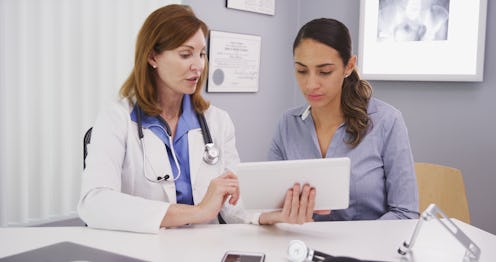Life
What Doctors Want You To Know If Breast Cancer Runs In Your Family

If someone in your family has been diagnosed with breast cancer, you may be wondering how that diagnosis impacts your possibility of getting the disease. According to the nonprofit Breastcancer.org, if a person with breasts has a first-degree relative (mother, sister, daughter) who has been diagnosed with breast cancer, their risk of developing the disease nearly doubles. However, less than 15% of women who are diagnosed with breast cancer have a family history of the disease. That means that no matter your family history of breast cancer, you should still know what your risk for the disease looks like.
“A family history of breast cancer does not automatically mean a breast cancer diagnosis,” Dr. Dorraya El-Ashry, PhD, Chief Scientific Officer of the Breast Cancer Research Foundation, tells Bustle. If you do have a family history of the disease, you should make sure to let your doctor know, she adds. It’s important that your doctor knows about the history of breast cancer on both sides of your family, Dr. Laurie Birkholz, MD, a women's health expert and certified menopause practitioner at Lakeshore Health Partners, says, as the presence of the disease in either of your parents’ relatives could potentially affect your health.
According to Breastcancer.org, about 12% of women in the general U.S. population will develop breast cancer. Among women with genetic mutations, 72% with the BRCA1 mutation and 69% with the BRCA2 mutation will develop breast cancer before turning 80. Breast cancer is less common in men, true, but men with the BRCA2 mutation have a 6.8% chance of developing breast cancer. (BRCA1 and BRCA2 mutations affect cancer-suppressing genes, which is why a positive BRCA diagnosis is linked with an increased risk of cancer.)
These statistics (and getting tested for any of these gene mutations) can help people understand their risks, but there are other models doctors and patients can follow together to build a more comprehensive picture. “We now understand that inherited risk is rarely due to a single gene mutation,” Dr. El-Ashry says. Multiple factors, including your specific genetic makeup and lifestyle, also contribute to your risk. (Other factors include age, weight, alcohol and/or tobacco consumption, among others.)
One way for health care professionals to assess a patient's risk of breast cancer is through the National Cancer Institute's Breast Cancer Risk Assessment Tool. "While no model is perfect, they do quite well in determining which women carry a high enough risk to warrant additional screenings and preventive treatments," Dr. Birkholz says. This tool looks at a person's medical and reproductive history and the history of breast cancer among their first-degree relatives to estimate their probability of developing invasive breast cancer before a certain age. However, the tool can't accurately predict the level of risk for people who have a BRCA1 or BRCA2 mutation, or a previous history of breast cancer.
Having a history of breast cancer in your family can be scary for both the person with the diagnosis and the other family members wondering if they're at risk, too.
Some of the lifestyle choices that could affect your risk for breast cancer include diet, exercise, and alcohol consumption. A possible way to lower your breast cancer risk is to increase your fiber intake, Dr. El-Ashry says, which is linked to reducing inflammation. According to the American Cancer Society, you should “get at least 150 minutes of moderate intensity or 75 minutes of vigorous intensity activity each week.” Dr. El-Ashry also recommends lowering your alcohol intake, and Dr. Birnholz warns against smoking tobacco products. If you have a family history of breast cancer, it’s important to avoid hormonal therapies, which health care professionals often prescribe for menopausal people to ease symptoms like hot flashes and sweating.
All this information can feel very overwhelming, especially if you are just beginning to evaluate your risks. There are many support networks and resources that can help you prioritize your health and feel less alone in the process. Bright Pink, an organization that helps people understand their breast and ovarian cancer risks and manage their health, provides an easy way for people to learn about their risks online in five minutes. The Breasties is another community-building organization that hosts retreats, events, and meet-ups for people around the world who may have been affected by breast and ovarian cancer.
Having a history of breast cancer in your family can be scary for both the person with the diagnosis and the other family members wondering if they're at risk, too. But, as these doctors explain, there are steps you can take to evaluate your health and figure out changes you can make to lower your risk. Instead of letting the fear of the unknown take over, speak to your doctor and create a plan that’s best for you.
Experts:
Dr. Dorraya El-Ashry, PhD, Chief Scientific Officer of the Breast Cancer Research Foundation
Dr. Laurie Birkholz, MD, certified menopause practitioner at Lakeshore Health Partners
This article was originally published on